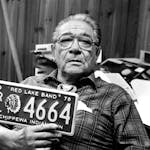With roots in the latest technology, black America's leading news source was the very definition of a start-up, launched in Chicago with its founder's last 25 cents. It quickly went viral, making millions, shaping the African-American community and galvanizing a national movement around the suspicious death of a black teenager.
The Chicago Defender, one of the most influential newspapers in U.S. history, did all of that and more, a century before #BlackLivesMatter made headlines and Black Twitter became a phenomenon.
In his new book, "The Defender: How the Legendary Black Newspaper Changed America," author Ethan Michaeli chronicles the Defender's role of speaking African-American truths — racism, brutality, injustice — to power, including U.S. presidents, most of Chicago's two-fisted mayors and an aspiring young politician named Barack Obama.
At the same time, however, Michaeli's documentary-style prose lays out an obituary of sorts for the black press, a once mighty but now nearly defunct institution that fought for equality and made U.S. history along with recording it.
It begins with the unlikely story of Robert S. Abbott, college-educated son of slaves and the stepson of a German immigrant, who grew up in rural Georgia, where he produced a newsletter for the family church. Enticed by the 1893 World's Fair but unable to find work as a lawyer, Abbott decided to act on an unlikely vision: use a 25-cent investment to create a weekly "race" newspaper exclusively for black Chicagoans, at the height of the nation's Jim Crow era.
As with most start-ups, Abbott depended on viral circulation — in this case, giving copies of "the World's Greatest Newsweekly" to Pullman railroad porters to carry down South. Copies, and circulation cards, would go from hand to hand, creating a circulation base beyond Chicago, building Abbott's fortune and political clout.
Although his success story rivals that of Facebook founder Mark Zuckerberg or newspaper baron William Randolph Hearst, Abbott didn't wait for wealth and power before engaging in politics or social activism, Michaeli writes. Steering toward the front lines of the civil rights fight, the Defender sounded a clarion call for blacks to migrate north from Dixie, held more than one president's feet to the fire over injustices and bore witness to the murder of native son Emmett Till — including publishing open-casket photos of the teen's mangled corpse, shocking the nation and exposing brutal Southern racism to the world.
As with many black institutions born of segregation, integration dealt a crippling blow to the Defender and the rest of the black press, writes Michaeli: Talented black journalists could get better opportunities, and make more money, working for the white press.
Still, it's easy to hear echoes of the newspaper's activism in the modern age, in trending tweets about Ferguson, Mo. — or current pressure on Chicago Mayor Rahm Emanuel over allegations that police covered up the questionable shooting death of a 17-year-old black youth last year.
As late as the 1990s, "The Defender continued to punch far above its weight, a resolute voice of conscience in a city rife with hatred, fear and greed, and in a nation that was not nearly done expiating its original sin."
Joseph P. Williams, a former assistant managing editor at the Star Tribune, is a senior news editor for U.S. News & World Report in Washington, D.C.




